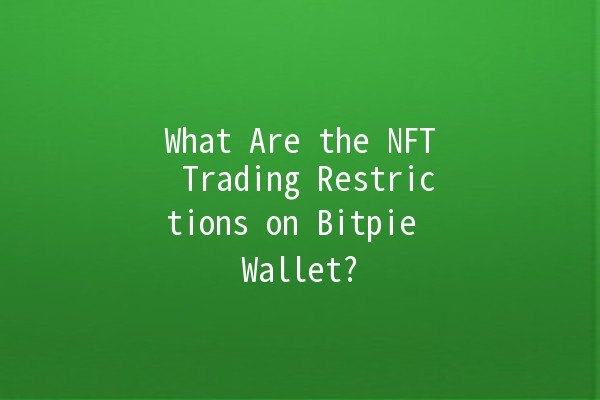
In the rapidly evolving world of cryptocurrency, understanding the limitations of various wallets is crucial for any investor, especially in the realm of NFTs (NonFungible Tokens). Bitpie wallet, a popular choice among crypto enthusiasts, allows users to store digital assets, including NFTs. However, there are several restrictions and limitations that users should be aware of when engaging in NFT trading using Bitpie. Below, we delve into these restrictions while providing practical tips to enhance your trading experience.
What is Bitpie Wallet?
Bitpie is a multicurrency wallet that supports various cryptocurrencies and tokens, including Bitcoin, Ethereum, and NFTs. Its userfriendly interface and robust security features make it a popular choice among users looking to engage in crypto trading and NFT collecting.
NFT Support in Bitpie Wallet
While Bitpie allows for NFT storage and management, it’s essential to note that not all NFTs may be compatible. Users must ensure that the NFTs they intend to store are supported by the wallet.
Key Limitations of Bitpie Wallet in NFT Trading
Not all NFTs from various platforms can be viewed or managed through Bitpie. Users should verify the compatibility of their NFTs with the wallet before attempting to trade or store them.

Unlike dedicated NFT marketplaces, Bitpie does not offer a builtin mechanism for buying and selling NFTs directly. Users must use external platforms to trade their NFTs, which can lead to potential security concerns.
High traffic on Ethereum and other networks can lead to slow transaction speeds and higher gas fees. As a result, trading NFTs through Bitpie during peak times can become costly and inefficient.
Certain NFTs may face restrictions on withdrawal from Bitpie, especially if they were acquired through specific platforms with their own withdrawal policies.
Bitpie lacks advanced trading features, such as limit orders or stoploss orders, which are commonly found in traditional crypto exchanges. This limitation can impact a trader’s ability to manage their NFT investments effectively.
To navigate the restrictions of Bitpie wallet effectively, consider the following productivity enhancement tips:
Tip 1: Research and Verify NFT Compatibility
Explanation
Before acquiring NFTs, research which tokens are compatible with Bitpie. Familiarize yourself with the supported standards, primarily ERC721 and ERC
Application Example
Use resources like NFT marketplaces and community forums to confirm if a specific NFT project is compatible with Bitpie. Check community feedback for successful integrations.
Tip 2: Utilize External Marketplaces for Trading
Explanation
Since Bitpie doesn’t host a marketplace, leverage established NFT marketplaces like OpenSea or Rarible to buy and sell your NFTs.
Application Example
After purchasing an NFT on OpenSea, transfer it to your Bitpie wallet for secure storage. When you decide to sell the NFT, do so directly through the marketplace.
Tip 3: Monitor Network Conditions
Explanation
Keep an eye on the Ethereum network traffic to avoid high gas fees and delays.
Application Example
Use tools like ETH Gas Station to monitor realtime gas prices. Consider scheduling transactions during offpeak hours to save money on fees.
Tip 4: Stay Updated on Bitpie Wallet Features
Explanation
Bitpie wallet regularly updates its features. Staying informed about these updates can help you take advantage of new functionalities.
Application Example
Follow Bitpie’s official channels on social media or subscribe to their newsletter. Regularly check for new features that may enhance NFT trading capabilities.
Tip 5: Secure Your NFTs
Explanation
Security is paramount when dealing with digital assets. Make sure you’re following best practices to keep your NFTs safe.
Application Example
Enable twofactor authentication on your Bitpie wallet and regularly back up your wallet to protect against potential losses.
Question 1: Can I use Bitpie Wallet to trade NFTs directly?
Answer: No, Bitpie does not provide a builtin marketplace for trading NFTs. Users must rely on external NFT marketplaces to buy or sell their NFTs. After acquiring or selling an NFT, users can securely store their assets in Bitpie.
Question 2: Are there specific NFT standards supported by Bitpie?
Answer: Yes, Bitpie predominantly supports ERC721 and ERC1155 token standards. Users should ensure their NFTs comply with these standards for seamless integration and storage.
Question 3: What should I do if an NFT cannot be withdrawn from Bitpie?
Answer: If you encounter withdrawal issues, verify whether the NFT is subject to restrictions based on the platform it was purchased from. Check the platform’s withdrawal policies and reach out to Bitpie support if you continue to experience issues.
Question 4: How can I ensure the security of my NFTs stored in Bitpie?
Answer: To ensure the security of your NFTs, enable twofactor authentication, use a strong, unique password, and regularly back up your wallet. Avoid sharing sensitive information and be cautious of phishing attempts.
Question 5: Is there a way to track my NFTs' value effectively?
Answer: While Bitpie does not provide a builtin feature for tracking NFT values, you can use NFT analytics platforms like NonFungible.com or Rarity.Tools to monitor the market value of your NFTs.
Question 6: How do transaction times affect NFT trading on Bitpie?
Answer: Transaction times can vary based on network congestion. During periods of high traffic, confirmation times may increase, leading to delays in NFT trading and potentially higher gas fees.
While Bitpie wallet offers users a secure option for storing cryptocurrencies and NFTs, it has notable restrictions on NFT trading. Understanding these limitations is key to optimizing your trading strategies. By employing the productivity tips outlined above, you can navigate these challenges effectively, ensuring a more streamlined and secure NFT trading experience. Remember to stay informed about your wallet's features and market dynamics to make wellinformed trading decisions. Happy trading!

